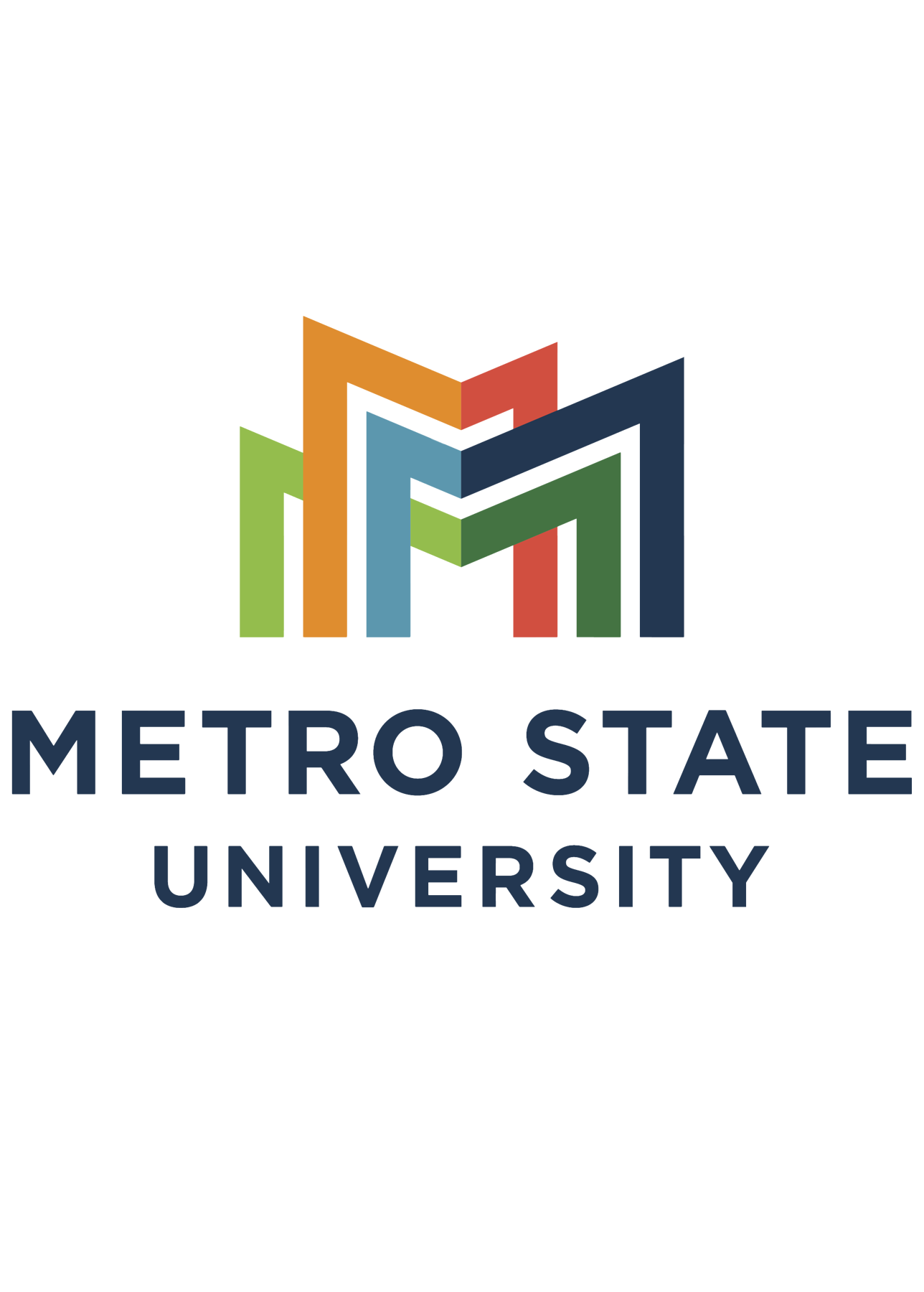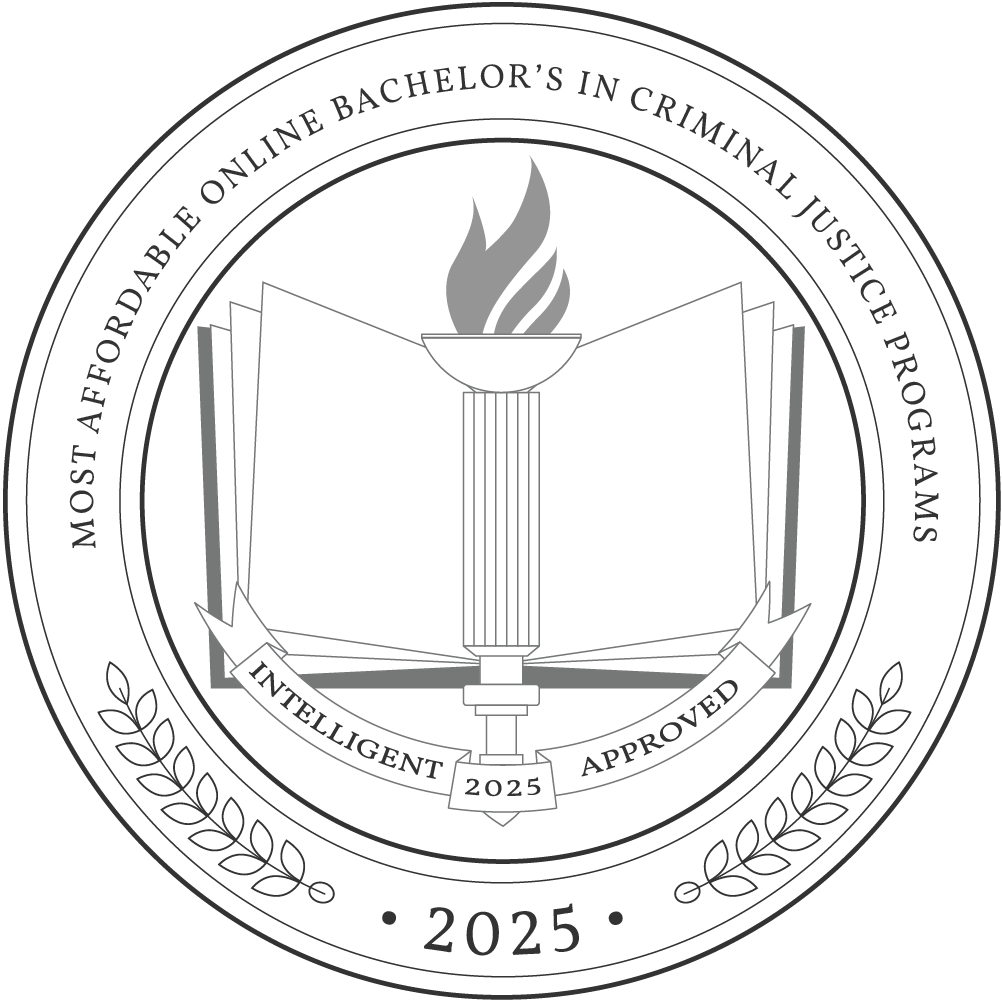While a college education often isn’t required for work in the criminal justice field, earning a degree will help you access more job opportunities, advance to higher positions, and make more money.
Employment in criminal justice-related fields, such as police officers and correctional treatment specialists, is expected to increase by 3% through 2032, according to the Bureau of Labor Statistics. Individuals in these roles earn more than the median annual wage and work in various settings, including local, state, and federal government agencies, private security companies, social assistance programs, and more.
For budget-conscious students, Intelligent.com created this list of the most affordable online criminal justice programs. We also interviewed Dana Marvin, an independent college counselor, for tips on paying for a college degree and how to choose the affordable online criminal justice program that’s right for you.
Why Trust Us
The Intelligent.com Higher Education Team is dedicated to providing students with independent, equitable school and program rankings and well-researched resources. Our expert-driven articles cover topics related to online colleges and programs, paying for school, and career outlooks. We use data from the U.S. Department of Education’s College Scorecard, the National Center for Education Statistics, and other reputable educational and professional organizations. Our academic advisory team reviews content and verifies accuracy throughout the year for the most current information. Partnerships do not influence rankings or editorial decisions.
- Analyzed over 2,000 national, accredited, and nonprofit colleges and universities
- 800+ rankings pages are reviewed and updated yearly
- Content is informed by reputable sources, surveys, and interviews with academic advisors and other experts
- Over 100 data points are reviewed for accuracy and quality throughout the year, including sources
How we rank schools
Our list features the best online Criminal Justice degree programs at top colleges nationwide. Each school featured is a nonprofit, accredited institution — either public or private — with a high standard of academic quality for post-secondary institutions.
We evaluated each school’s program on tuition costs, admission, retention and graduation rates, faculty, reputation, and the student resources provided for online students. We collected data from trusted sources like the National Center for Education Statistics, individual school and program websites, school admissions counselors, and other data sources. Then, we calculated the Intelligent Score on a scale of 0 to 100 based on the following criterion:
Academic Quality:
- Admission rate versus enrollment rate
- Retention rate of students who return after year one
- Accreditation status (regional and programmatic)
- Nonprofit status, both private and public institutions
Graduation Rate
- Overall graduation rate
- Total number of currently enrolled students, including diversity metrics
- Student-to-faculty ratio
Cost and ROI
- In-state and out-of-state per-credit tuition rates and fees
- Required credits to graduate
- Earning potential after graduation
- Availability of federal student loans, scholarships, and other financial aid options
Student Resources
- Available student services for online-only and hybrid programs
- On-campus amenities like tutoring centers and the number of libraries
Read more about our ranking methodology.
47 Most Affordable Online Bachelor’s in Criminal Justice Programs
FiltersInstitution Type
Status
- Intelligent Score
- Alphabetically By University Name
- Acceptance Rate
- Enrollment
- In-state Graduate Tuition
- Out-of-state Graduate Tuition
- In-state Undergraduate Tuition
- Out-of-state Undergraduate Tuition

Florida International University
Intelligent Score: 99.73In-state: $4,721
Out-of-state: $16,529
In-state: $8,912
Out-of-state: $8,912
SAT: 1110-1260
ACT: 23-29
In-State: $235
Out-of-State: $648
Online, On-Campus
Southern Association of Colleges and Schools Commission on Colleges
120

University of Central Florida
Intelligent Score: 99.6In-state: $4,478
Out-of-state: $19,810
In-state: $6,916
Out-of-state: $6,916
SAT: 1160-1340
ACT: 25-30
In-State: $179
Out-of-State: $715
Online, On-Campus
Southern Association of Colleges and Schools Commission on Colleges
120

Western Carolina University
Intelligent Score: 99.09In-state: $1,000
Out-of-state: $5,000
In-state: $4,435
Out-of-state: $4,435
SAT: 1020-1220
ACT: 20-25
In-State: $41
Out-of-State: $208
Online, On-Campus
Southern Association of Colleges and Schools Commission on Colleges
122-123

Arizona State University
Intelligent Score: 98.59In-state: $10,710
Out-of-state: $28,800
In-state: $11,720
Out-of-state: $11,720
SAT: 1100-1320
ACT: 21-28
$574
Online, On-Campus
Higher Learning Commission
120

Georgia Southwestern State University
Intelligent Score: 98.03In-state: $4,064
Out-of-state: $14,786
In-state: $3,492
Out-of-state: $3,492
SAT: 940-1110
ACT: 19-22
$199
Online
Southern Association of Colleges and Schools Commission on Colleges
120

Valdosta State University
Intelligent Score: 97.18In-state: $4,371
Out-of-state: $15,426
In-state: $4,572
Out-of-state: $4,572
SAT: 990-1140
ACT: 19-23
$187
Online, On-Campus
Southern Association of Colleges and Schools Commission on Colleges
120

Kennesaw State University
Intelligent Score: 96.23In-state: $4,450
Out-of-state: $15,704
In-state: $5,328
Out-of-state: $5,328
SAT: 1030-1200
ACT: 19-25
$185
Online, On-Campus
Southern Association of Colleges and Schools Commission on Colleges
120

University of the Cumberlands
Intelligent Score: 96.01In-state: $9,875
Out-of-state: $9,875
In-state: $4,282
Out-of-state: $4,282
SAT: 930-1140
ACT: 19-24
$220
Online, On-Campus
Southern Association of Colleges and Schools Commission on Colleges
120

Metropolitan State University
Intelligent Score: 94.94In-state: $7,136
Out-of-state: $14,560
In-state: $8,405
Out-of-state: $8,405
SAT: N/A
ACT: N/A
$285
Online
Higher Learning Commission
120

Georgia Highlands College
Intelligent Score: 93.05In-state: $20,340
Out-of-state: $26,692
In-state: NA
Out-of-state: NA
SAT: 480 or higher
ACT: 17 or higher
$199
Online
Southern Association of Colleges and Schools Commission on Colleges
124-126

Fort Valley State University
Intelligent Score: 92.19In-state: $4,064
Out-of-state: $14,786
In-state: $4,344
Out-of-state: $4,344
SAT: N/A
ACT: N/A
$169
Online, On-Campus
Southern Association of Colleges and Schools Commission on Colleges
123

Clayton State University
Intelligent Score: 91.89In-state: $4,064
Out-of-state: $14,786
In-state: $5,760
Out-of-state: $5,760
SAT: N/A
ACT: N/A
$169
Online
Southern Association of Colleges and Schools Commission on Colleges
120

Florida Atlantic University
Intelligent Score: 90.93In-state: $2,522
Out-of-state: $14,374
In-state: $5,467
Out-of-state: $5,467
SAT: 1060-1220
ACT: 21-26
Resident: $203
Non-Resident: $721
Online, On-Campus
Southern Association of Colleges and Schools Commission on Colleges
120

Middle Georgia State University
Intelligent Score: 89.25In-state: $2,728
Out-of-state: $10,075
In-state: $3,582
Out-of-state: $3,582
SAT: N/A
ACT: N/A
$174
Online, On-Campus
Southern Association of Colleges and Schools Commission on Colleges
120

Drexel University
Intelligent Score: 89.24In-state: $53,868
Out-of-state: $53,868
In-state: $36,234
Out-of-state: $36,234
SAT: 1180-1380
ACT: 25-31
$473
Online, On-Campus
Middle States Commission on Higher Education
120

Georgia Southern University
Intelligent Score: 88.77In-state: $4,371
Out-of-state: $15,425
In-state: $4,986
Out-of-state: $4,986
SAT: 993-1170
ACT: 18-24
$182
Online, On-Campus
Southern Association of Colleges and Schools Commission on Colleges
124

Washington State University
Intelligent Score: 88.14In-state: $10,202
Out-of-state: $25,145
In-state: $11,781
Out-of-state: $11,781
SAT: 1020-1210
ACT: 20-26
Resident: $584
Non-Resident: $651
Online, On-Campus
Northwest Commission on Colleges and Universities
120

Sam Houston State University
Intelligent Score: 87.76In-state: $5,856
Out-of-state: $15,672
In-state: $5,765
Out-of-state: $5,765
SAT: 970-1120
ACT: 18-23
Resident: $636
Non-Resident: $1,044
Online, On-Campus
Southern Association of Colleges and Schools Commission on Colleges
120
Cost Breakdown for an Online Bachelor’s in Criminal Justice Program
When setting a budget for your online criminal justice degree program, it’s important to consider all the costs associated with earning this degree.
- Tuition: This is the primary cost related to higher education and is usually based on the number of credits a student takes each term. Most schools charge full-time students a flat per-term tuition rate, while part-time students pay per credit hour. Students should consult their school’s financial aid office for the most accurate information about how much tuition is and how it is assessed.
- Fees: Schools often charge additional fees for expenses not covered by tuition. For example, colleges may charge online students a fee for virtual classroom technology, such as online course platforms or tech support. Students should clarify with a financial aid counselor whether there are any fees they must pay besides tuition and if the fees are assessed annually or on a one-time basis.
- Personal technology: Reliable hardware and internet access are essential for success in online degree programs. Before you start your online criminal justice degree program, assess your technology set-up and determine if you need to upgrade your computer, webcam, microphone, or internet service to ensure everything will work smoothly. Check with your school to find out if they partner with retailers or companies to offer students discounts on essential tech supplies.
- Books and supplies: According to the Education Data Initiative, the average postsecondary student spent between $628 and $1,200 for books and supplies during the 2021-2022 academic year. Therefore, it’s essential to budget for this expense as well. Also, consider if your program requires an internship, which may mean additional costs for business attire or transportation to your internship site.
Factors Influencing the Cost of an Online Bachelor’s in Criminal Justice Program
The price of tuition varies from college to college, based on multiple factors.
Public vs. private institution
An institution’s status as a public or private college significantly impacts its tuition rates. Because public colleges use state tax revenue for funding, they offer subsidized tuition rates to students who live in the state where the school is located. Out-of-state students typically pay a higher tuition rate, although it’s becoming more common for state schools to charge online students the same tuition rate, regardless of where they live. Conversely, private colleges don’t use public money, so they charge all students the same tuition rate regardless of residency. Tuition at private colleges tends to be higher than public schools because they rely more on tuition as a revenue source.
Nonprofit vs. for-profit
Another college classification status is non-profit and for-profit. All public and most private universities are non-profit, which means they must reinvest revenue into the institution through faculty and staff salaries, infrastructure, student services, and more. For-profit schools operate like corporations, with the primary goal of earning a profit. While tuition rates may be lower at for-profit schools, these institutions typically invest less in faculty, infrastructure, and other student resources. Therefore, students at for-profit colleges may receive a different quality of education than those at non-profits. Students considering for-profit schools should carefully review how the institution invests its money and its student outcomes.
Student military status
A student’s military status can also affect their tuition rate, as many colleges offer discounts to active-duty service members or veterans. Depending on the school, military benefits may extend to spouses and children. Students who think they might be eligible should consult the school’s financial aid office for more information.
Number of credits and completion time
The total number of credits students must complete to earn their online criminal justice degree will also influence what they pay for their degree. More extended programs will likely result in a higher cost, although the per-credit tuition rate also determines this.
How to Choose the Online Bachelor’s in Criminal Justice Degree Program that’s Right for You
Clarify your needs and goals
Although your priority may be finding an affordable online criminal justice degree program, there are several other factors to consider when choosing one. Reflecting on your career goals and how an online criminal justice degree will help you achieve them can facilitate a smoother search and selection process.
What type of job do you seek, and what skills and knowledge will you need to qualify for those positions? Is there a particular area of criminal justice that you want to focus on, such as criminal psychology, law enforcement, or computer forensics? Are you interested in an internship or field experience? Thinking about all these factors now will help you set parameters for the type of program that you want.
Establishing your logistical needs is also helpful, as this can guide the type of program you seek out. For the most flexibility, consider asynchronous programs that allow students to complete lessons and assignments independently. Students who prefer learning through real-time interaction may prefer synchronous programs that feature regularly scheduled virtual classes.
Research schools and programs
Once you’ve set some criteria for the type of program you want, you can begin exploring your options.
The first thing to check with any schools you’re considering is their accreditation status. At the institutional level, schools should be regionally accredited by a recognized accrediting agency. Accreditation guarantees that school programs meet high-quality standards and can affect a student’s eligibility for financial aid, jobs, and further education opportunities.
Other questions to ask during the research process include:
- Who are the program’s faculty, and what are their credentials?
- Does the curriculum include hands-on learning experiences like internships?
- What support services does the school offer online students?
- How affordable is the school compared to your other options?
Schools generally include this information on their website or with marketing materials available to potential students. They may also offer online open houses or information sessions where students can speak to faculty, students, and admissions counselors. Following schools, programs, and faculty on social media is another way to learn more about a program.
Review application and eligibility requirements
While gathering information about schools, be sure to find out their application and eligibility requirements, as this will vary from school to school. Note any deadlines programs may have, as failing to complete an application by advertised deadlines can impact your ability to start your program at your desired time.
In general, applicants to an online criminal justice degree program can expect to submit the following:
- Completed application and required fees
- Official transcripts from undergraduate college(s) attended
- Letters of recommendation
- Personal essay
- Resume or CV
- SAT or ACT scores
Contact their admissions office if you have questions or need clarification about a school’s application processes.
How to Pay for an Online Bachelor’s in Criminal Justice Degree
There are many ways to pay for an online criminal justice degree, with most students using some combination of the methods outlined below:
Employer tuition reimbursement
Students working while earning an online criminal justice degree should inquire with their employer to find out if they offer tuition assistance benefits. It is often an option for those who already work in a field related to criminal justice, such as law enforcement, as employers benefit when their workers have additional training and education. Exact benefits vary by employer, but in most cases, employers will reimburse students for some or all of their tuition for completed courses.
Work-study
Over 3,000 postsecondary institutions participate in the Federal Work-Study program, which provides part-time employment opportunities for college students. These jobs may involve working directly for your school or off-campus for a community service partner. Unlike financial aid awards that must be applied directly to your tuition or related educational expenses, you can use this income for whatever you want.
Scholarships and grants
“Students and their families should explore all available avenues for scholarships and grants, both from the school and from outside organizations, as they can either lower the program’s overall cost or cover it completely,” Marvin says.
Scholarships and grants are considered gift aid because they don’t have to be repaid. Grants are typically awarded based on financial need, while students can receive scholarships for their academic, athletic, or extracurricular achievements, being part of a specific demographic, or their financial need. For need-based scholarships, students must typically submit the Free Application for Federal Student Aid (FAFSA).
Many scholarships and grants are available for criminal justice majors. Each scholarship program has its own eligibility criteria, so students must research to determine which ones they qualify for. The most generous criminal justice scholarship opportunities include the following options:
- Ritchie-Jennings Memorial Scholarship Program: The Association of Certified Fraud Examiners offers this program for students pursuing an anti-fraud career. The maximum award is $10,000.
- Ruth D. Peterson Fellowship for Racial and Ethnic Diversity: The American Society of Criminology provides this fellowship to students of color who have been accepted into a doctoral degree program for criminal justice, criminology, or a similar area of study. Up to three $6,000 fellowships are awarded each year.
- Harold Johnson Law Enforcement Scholarship: This scholarship of up to $5,000 is for undergraduate students who attended high school in the San Francisco Bay area and plan to work in a criminal justice field, such as police work or corrections.
Federal student loans
College students can borrow money to pay for tuition and other educational expenses through the Federal Student Aid (FSA) program. Federal student loans have interest rates and repayment terms set by Congress. Undergraduate students are eligible for subsidized loans, while graduate students are eligible for unsubsidized loans. Students submit the Free Application for Federal Aid (FAFSA) to determine how much money they can borrow through the FSA program.
Regarding borrowing money through the FSA program, Marvin offers some advice. “Take out only as much money as you need and nothing more,” she says. “For example, if you’re eligible to take out a loan for $12,500 per year but only need $8,000, there’s no need to take out a loan for that extra funds. Remember, every dollar you take out in a loan must be paid back, with interest.”
Marvin also reminds students that they don’t have to wait until they complete their degree to repay loans. “You can begin paying off your loans once they have been taken out. Even paying off a few hundred or thousand dollars before finishing school can greatly affect how much you have to repay post-graduation.”
Private education loans
Because there are limits on how much students can borrow in federal student loans, some individuals may need loans from private lenders like Sallie Mae, Ascent, or SoFi to cover all their educational expenses. Private education loans differ from federal student loans because their interest rates and repayment terms are based on current market rates and the borrower’s credit history. Therefore, they may be less favorable than terms for federal student loans. “For students who need a private education loan, it’s necessary to show around for the best rate,” Marvin says. “Keep an eye on sites like NerdWallet throughout the school year to see which companies have the best interest rates. While one company might have the best rate when browsing today, that rate could easily skyrocket by the time you’re ready to commit.”
Out-of-pocket
When students or families use their own money to pay for tuition and other education-related expenses, it’s considered paying out-of-pocket. Most students pay at least some education expenses this way, in combination with scholarships, grants, loans, and other payment methods. “Students who are paying some or all of their tuition out-of-pocket should reach out to the college to see if there is a payment plan for tuition,” Marvin says. “For some students or families, a small monthly payment plan going directly to the college without interest may be more manageable than paying a lump sum at the beginning of the term.”
Online Scholarship Database
Intelligent Scholarship Finder Tool
"A Helping Hand" Scholarship
Award Amount: $500
Due Date: January 31, 2025
"Follow Your Own Path" Essay Scholarship
Award Amount: $500
Due Date: January 31, 2025
"Tuition Solution" Scholarship for STEM Students
Award Amount: $500
Due Date: January 31, 2025
$25k "Be Bold" No-Essay Scholarship
Award Amount: $25,000
Due Date: Closed for 2024
(ISC) Graduate Cybersecurity Scholarship
Award Amount: $5,000
Due Date: Closed for 2024
(ISC) Women in Information Security Scholarship
Award Amount: $5,000
Due Date: Closed for 2024
A.C. "Kate" & Leo Joseph Merlone St. Dominic Catholic Church of Saginaw Member Scholarship
Award Amount: Varies
Due Date: Closed for 2024
A.C. "Kate" & Leo Joseph Merlone Teaching Scholarship
Award Amount: Varies
Due Date: Closed for 2024
a/e ProNet David W. Lakamp Scholarship
Award Amount: $5,000
Due Date: Closed for 2024
AAAE Native American Scholarship
Award Amount: $1,500
Due Date: March 15, 2025
What Can You Do With an Online Criminal Justice Degree?
Students who earn an online degree in criminal justice have a range of career paths available to them. Growth in the field is driven by factors such as evolving criminal behaviors, changes in legislation, and the ongoing need for public safety.
A bachelor’s degree is sufficient for entry-level positions as police officers, probation officers, and correctional treatment specialists. Individuals interested in joining law enforcement agencies as police officers must also complete police academy training and meet basic eligibility requirements.
A criminal justice degree can also lead to employment in correctional facilities, private security firms, government agencies (local, state, and federal), and legal services. It can provide a solid foundation for further study in forensic science, forensic psychology, and legal studies for advanced roles as forensic psychologists and lawyers.
Career outlook
- Police and detectives — Perform a wide range of tasks related to protecting lives and property, including responding to emergency and non-emergency calls, patrolling assigned areas, obtaining and serving warrants, arresting people suspected of committing crimes, and preparing cases for legal proceedings.
- Median annual salary: $74,910
- Projected employment growth (through 2032): 3%
- New jobs projected: 64,500 per year
- Probation officers and correctional treatment specialists — Interview probationers and parolees, as well as friends and relatives to assess progress and determine the best course for rehabilitation. They also complete pre-hearing investigations, and testify in court or before parole boards regarding clients’ backgrounds and progress, and write reports and maintain case files on clients.
- Median annual salary: $61,800
- Projected employment growth (through 2032): 3%
- New jobs projected: 7,400 per year
- Lawyers (with additional education) — Advise and represent clients in criminal or civil proceedings and other legal matters; present facts and findings relevant to a case on behalf of their clients, and prepare and file legal documents, such as lawsuits, contracts, and wills.
- Median annual salary: $145,760
- Project employment growth (through 2032): 8%
- New jobs projected: 39,100 per year



